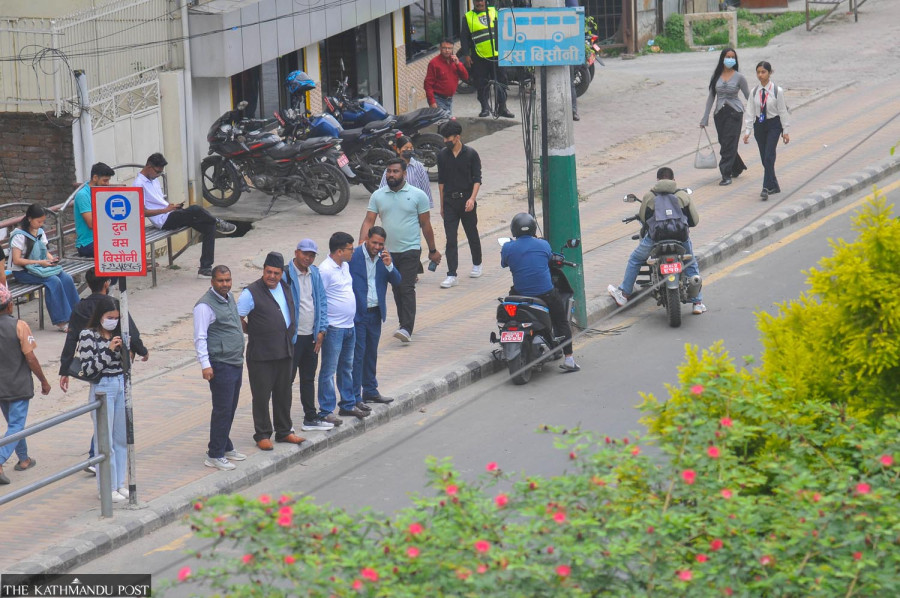Editorial
Right to ride
Genuine concerns must be addressed, but safe and affordable transport is non-negotiable.
On Monday, streets in many major cities in Nepal got unusually quiet as public transport operators went on a nationwide strike. Many commuters, including patients and students travelling in and out of the cities, were stranded. The strike came in response to the Gandaki province government’s introduction of new rules to regulate ride-hailing. Although the regulation intends to formalise and oversee ride-hailing companies operating through mobile apps, the ‘central struggle committee’ of transport operators believes it goes against the interest of public transport and is unlawful.
Even as there was an understanding between the federal government and public transport operators to suspend ride-hailing regulations, the Gandaki provincial government was yet to receive an official letter. Only some public transport vehicles were seen on the streets of Kathmandu on Tuesday, as most operators were reluctant to operate until a clear decision was made in their favour. However, later in the evening, a joint meeting involving the chief minister, provincial ministers and the negotiation committee decided to keep the regulation, officially titled Ride-Hailing (Regulation and Management) Guideline, 2025, on hold for a month.
The regulation of Nepal’s ride-hailing services has long been drawn into controversy. Such services had been fully functional and flourishing in Kathmandu for years without being legally recognised. In 2020, the Patan High Court finally instructed the government to regulate such services. It was only in 2024 that the federal government amended the Industrial Enterprise Act (2020) to formally recognise ride-hailing as a legal, service-oriented business—seven years after such services were introduced in Nepal. However, the regulatory parts remained in the shadows. Only in January 2024 did the Supreme Court instruct the government to fast-track legislation to regulate ride-hailing platforms. Shortly after, Gandaki Province became the first to approve guidelines to legalise such services.
In Nepal, especially within the Kathmandu Valley, public transport has failed to provide a safe, inclusive, and dignified experience. It’s common to see passengers, regardless of their age or ability, packed into overcrowded, speeding public vehicles. Commuters are left guessing when a bus will arrive, as there is no fixed schedule. Ride-hailing services like Pathao, InDrive, and others emerged as a revolutionary alternative that made commuting easier for those who could afford it. This has also become a source of income for many people in Nepal’s gig economy. However, without clear regulations, there have been reports of drivers overcharging passengers, harassing them, or falsely identifying themselves as affiliated with ride-hailing platforms.
But it is the commuters whose interest should get the first priority. Governments regulate ride-hailing services in countries around the world. In India, the Motor Vehicle Act of 2020 allows individual states to set regulations for ride-hailing aggregators. Delhi, Mumbai, and Bengaluru all have different policies—yet they all work. So it is erroneous to say that legalising these services will hamper the country’s public transport. While some people may prefer ride-hailing services, others will continue to choose public transport.
The coexistence of ride-hailing services and public transport offers people choices, enabling them to select what best suits their preferences and budgets, a basic feature of the market economy. Now that the government has a month to hold further talks with the transport sector, it must properly communicate with the transport entrepreneurs, instead of giving in to their pressure and agreeing to irrational demands. As for their genuine concerns over legal ambiguities, the government should listen to them and try to find mutually agreeable solutions. In the last few days, many Nepalis did not have any means of transport, and some ride-hailing service riders took advantage of the situation and charged more. Again, the bottom line is that while in a democracy everyone deserves a proper hearing, people’s right to safe and affordable transport is non-negotiable.




 9.89°C Kathmandu
9.89°C Kathmandu














